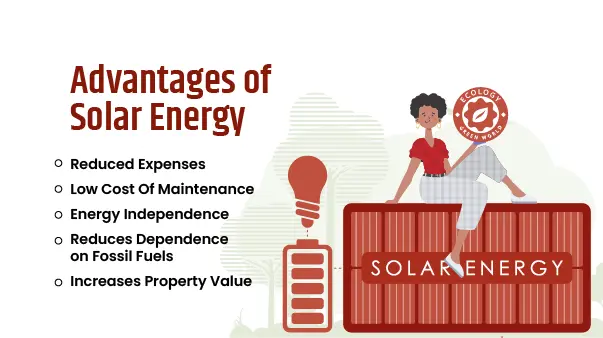Advantages And Disadvantages of Solar Energy
As you may know, the region has an estimated number of 300 days of sunshine every year. This makes the region one of the most suitable areas to tap into solar energy. With all the worries surrounding rising electricity costs and pollution, solar power still proves to be a reliable and sustainable solution for both households and businesses in the region.
Solar energy in the world was criticized for being a costly and inefficient source of energy, but because of technology, government subsidies, and rise in domestically produced solar panels, solar energy is now more accessible and efficient. Many households are already benefitting from solar energy, but is it the right investment for you? Let’s go over the pros and cons of solar energy.
Pros and Cons of Solar Energy
In the country, the adoption of solar energy has seen growth over the years considering that the government has overreaching strategies for PM-KUSUM and subsidies for rooftop solar installation. But regardless, it is essential to consider what the advantages and disadvantages of this investment would be.
|
Pros of Solar Energy |
Cons of Solar Energy in India |
|
Reduces Monthly Electricity Bills |
Performance Affected by Monsoons |
|
Low Maintenance Costs |
High Initial Investment Cost |
|
Energy Independence from the Grid |
Expensive Battery Storage |
|
Reduces Dependence on Fossil Fuels |
Requires Large Roof or Open Space |
|
Increases Property Value |
Grid Connection Can Be Complex |
|
Government Subsidies and Incentives |
Efficiency Depends on Location |
|
Ideal for Remote and Rural Areas |
Recycling and Disposal Challenges |
Advantages of solar energy

1. Helps In Reducing Household Electricity Expenses
It is no news that in India electricity costs keep going higher, having solar panels can greatly reduce the expenses in households and commercial properties. Users can also earn from extra power through Net Metering programs.
2. Cost Of Maintenance Is Not Much
Once installed, solar panels require little to no maintenance. A bit of servicing and cleaning can do wonders and ensure performance efficiency for the next 20-25 years.
3. Energy Independence from the Grid
Solar energy gives security for households and businesses alike, decreasing reliance on constant electricity cuts and expensive fluctuating prices.
4. Reduces Dependence on Fossil Fuels
Adopting solar energy reduces dependence on coal and oil, which helps curb carbon emissions and improve air quality.
5. Increases Property Value
The resale value of residential and commercial properties that are outfitted with solar panels is much higher and often appeals to environmentally friendly customers.
6. Government Subsidy Programs
These are some of the programs that provide subsidy on solar panel installation; PM-KUSUM, Rooftop Solar Program and some others makes it more accessible to the public.
7. Best Suited For Remote Areas
In rural settings and areas where the power grid is undeveloped, solar energy works as a dependable energy source that increases access to power and other vital services.
Disadvantages of solar energy

1. Solar Panels are Less Effective During Monsoons
Solar panel does not perform optimally during the rainy season as there is insufficient sunlight.
2. High Initial Investment Cost
There is a significant initial investment that is needed for purchasing protective mounts, panels, power grid inverter, batteries, surge protection, and other equipment.
3. Battery Storage is Costly
When there is no sunlight, the only way to store solar energy is in batteries, however, these batteries can be expensive and often need to be replaced.
4. Needs Ample Roofing or Free Area
As for both houses and companies, there is a need for adequate space for installation of solar panels if meaningful power generation is to take place, and such space may be limited in cities.
5. Grid Connection Might Be Difficult to Achieve
Making an arrangement of net metering and joining the solar systems with the local electricity network is a procedure that can be intricate and lengthy.
6. Operational Efficiency Is Location Dependent
The operational efficiency of solar systems differs across India with regions that get high sun exposure – like Rajasthan and Gujarat – being more conducive to solar energy as against areas which are prone to clouds.
7. Recycling and Disposal Challenges
In India, it is an issue that does need proper attention to the disposal and recycling of outdated solar panels as well as batteries due to not having enough domestic recycling infrastructure.
Is Solar Energy Suitable For You?
Indeed, with India’s wide spectrum of sunlight, government aid, and increasing cost of electricity, solar energy is greatly advantageous to individuals and businesses. Yet, before making these changes location, budget, and space factors should be evaluated.
The future of solar energy in India looks bright, and with the advancements in technology, it is bound to become cheaper and more efficient than before, it would be wise to invest in it now as the country transitions towards a more cost effective and clean energy source.
